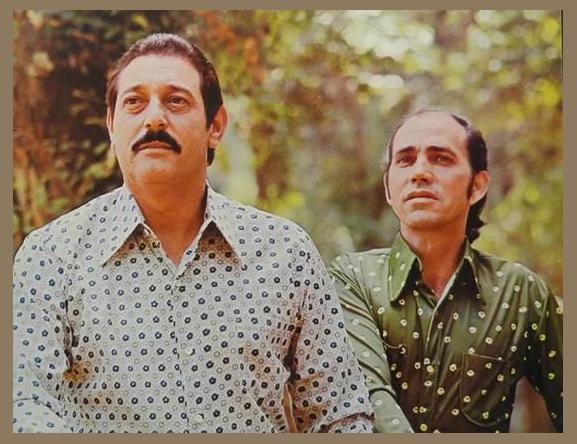 Zé Mineiro e Mirandinha
Zé Mineiro e Mirandinha
Zé Mineiro e Mirandinha: The Timeless Duo of Brazilian Samba
Zé Mineiro and Mirandinha, the iconic samba duo from Minas Gerais, Brazil, have etched an indelible mark on the musical landscape of their country. Their unparalleled artistry and heartfelt performances have captivated audiences for decades, leaving an enduring legacy that continues to resonate today.
Members:
* Zé Mineiro: Born José Geraldo Bastos in 1954, Zé Mineiro was the lead vocalist and composer for the duo. His soulful voice and evocative lyrics perfectly conveyed the raw emotions and experiences of the working class.
* Mirandinha: Born José Miranda in 1955, Mirandinha was the virtuoso guitarist who provided the rhythmic backbone and intricate melodies for Zé Mineiro's songs. His exceptional technique and improvisational skills complemented Zé Mineiro's vocals seamlessly.
Challenges:
Despite their immense talent, Zé Mineiro and Mirandinha faced significant challenges in their early career. They struggled for recognition in the highly competitive music industry, facing rejection and skepticism from record labels. However, their unwavering determination and relentless pursuit of their dreams eventually paid off.
Controversies:
The duo's outspoken lyrics and social commentary often drew controversy. Their song "Macaca Velha" (Old Monkey Woman) became a subject of debate due to its perceived misogynistic undertones. However, Zé Mineiro and Mirandinha defended their artistic freedom, arguing that their songs reflected the realities and struggles of everyday life in Brazil.
Discography:
Zé Mineiro e Mirandinha released a series of critically acclaimed albums that showcased their unique blend of samba, bossa nova, and popular Brazilian music. Some of their most notable recordings include:
* "Zé Mineiro e Mirandinha" (1981)
* "Deixa o Povo Falar" (1983)
* "Nosso Tempo" (1985)
* "Força do Povo" (1987)
* "Samba na Veia" (1991)
Legacy:
Zé Mineiro e Mirandinha's music has transcended generations and continues to inspire and delight audiences worldwide. Their songs have been covered by countless artists, and their influence can be heard in contemporary Brazilian music. Despite their untimely passing in 2012 and 2011, respectively, their legacy lives on as a timeless testament to the power of music to connect hearts and bridge divides.
Zé Mineiro and Mirandinha, the iconic samba duo from Minas Gerais, Brazil, have etched an indelible mark on the musical landscape of their country. Their unparalleled artistry and heartfelt performances have captivated audiences for decades, leaving an enduring legacy that continues to resonate today.
Members:
* Zé Mineiro: Born José Geraldo Bastos in 1954, Zé Mineiro was the lead vocalist and composer for the duo. His soulful voice and evocative lyrics perfectly conveyed the raw emotions and experiences of the working class.
* Mirandinha: Born José Miranda in 1955, Mirandinha was the virtuoso guitarist who provided the rhythmic backbone and intricate melodies for Zé Mineiro's songs. His exceptional technique and improvisational skills complemented Zé Mineiro's vocals seamlessly.
Challenges:
Despite their immense talent, Zé Mineiro and Mirandinha faced significant challenges in their early career. They struggled for recognition in the highly competitive music industry, facing rejection and skepticism from record labels. However, their unwavering determination and relentless pursuit of their dreams eventually paid off.
Controversies:
The duo's outspoken lyrics and social commentary often drew controversy. Their song "Macaca Velha" (Old Monkey Woman) became a subject of debate due to its perceived misogynistic undertones. However, Zé Mineiro and Mirandinha defended their artistic freedom, arguing that their songs reflected the realities and struggles of everyday life in Brazil.
Discography:
Zé Mineiro e Mirandinha released a series of critically acclaimed albums that showcased their unique blend of samba, bossa nova, and popular Brazilian music. Some of their most notable recordings include:
* "Zé Mineiro e Mirandinha" (1981)
* "Deixa o Povo Falar" (1983)
* "Nosso Tempo" (1985)
* "Força do Povo" (1987)
* "Samba na Veia" (1991)
Legacy:
Zé Mineiro e Mirandinha's music has transcended generations and continues to inspire and delight audiences worldwide. Their songs have been covered by countless artists, and their influence can be heard in contemporary Brazilian music. Despite their untimely passing in 2012 and 2011, respectively, their legacy lives on as a timeless testament to the power of music to connect hearts and bridge divides.